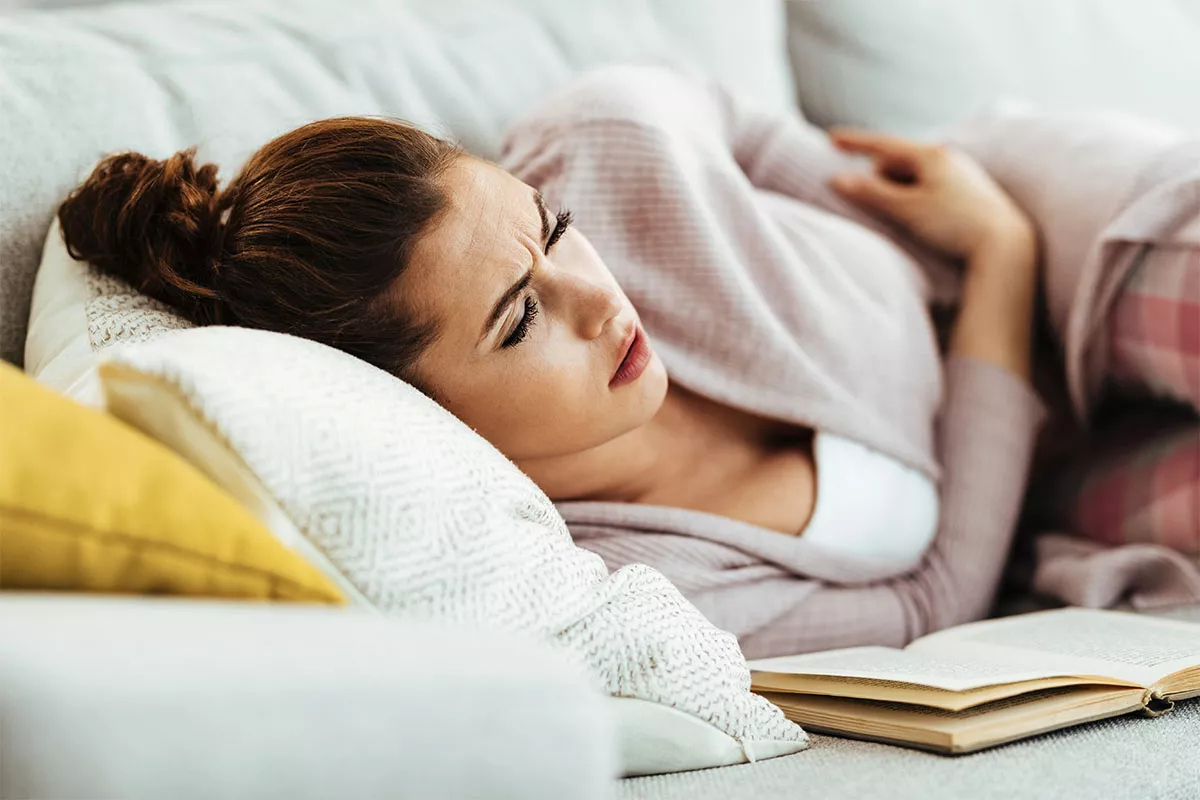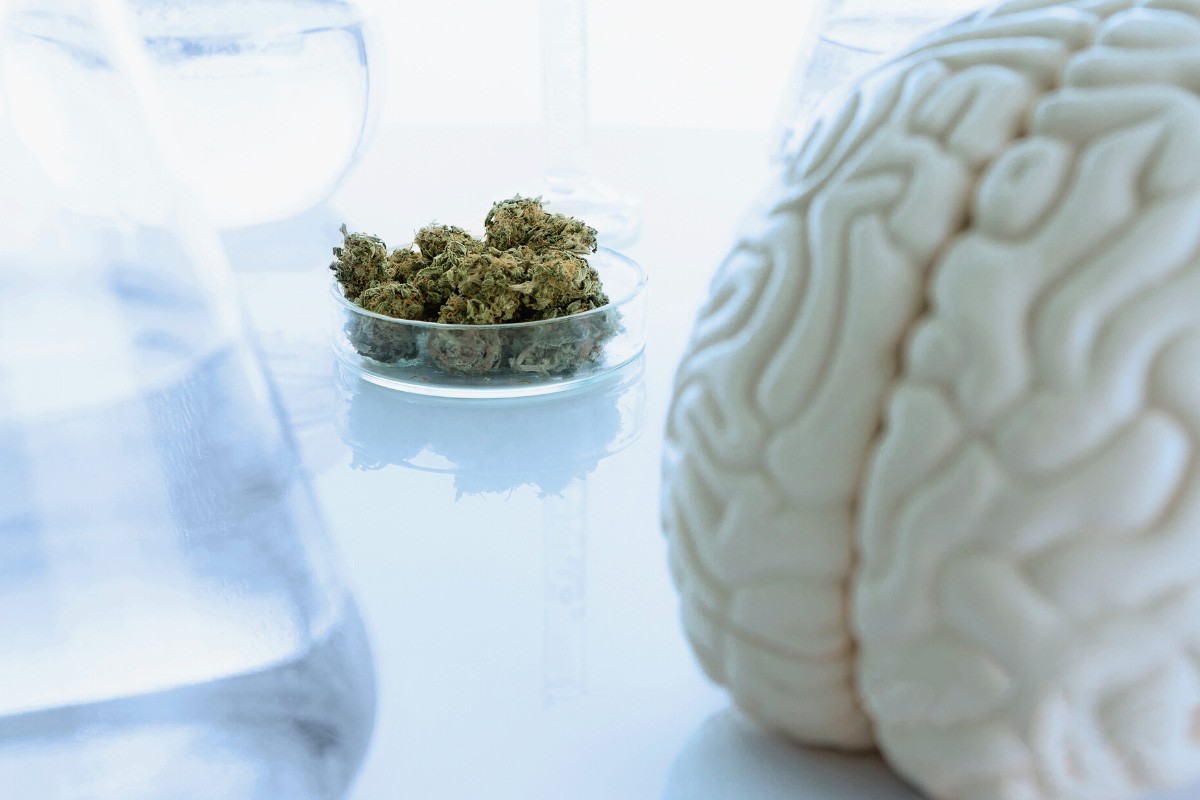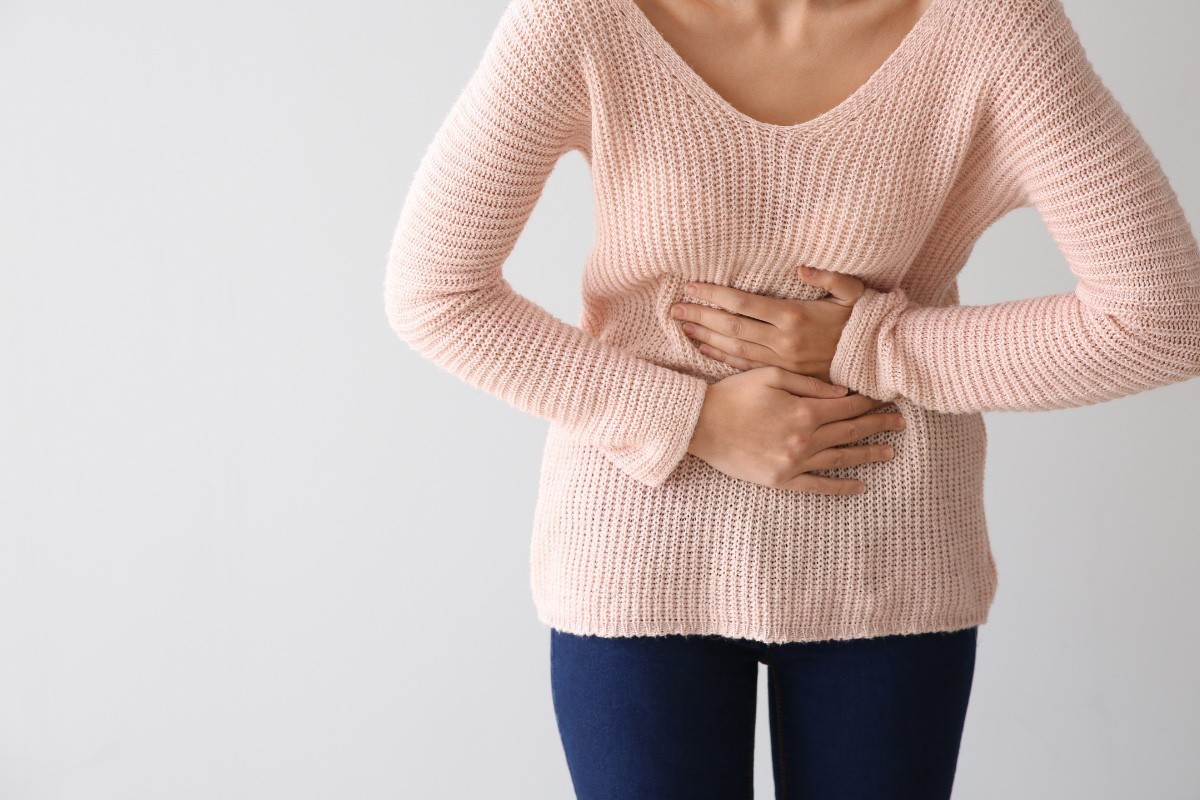This question was addressed by a team of researchers from the Department of Psychology led by Melissa Slavin at the University of Albany in the USA. They investigated the relationship between cannabis use and symptoms of premenstrual syndrome (PMS) and premenstrual dysphoric disorder (PMDD), which can be associated with multifaceted pain in patients.
Premenstrual syndrome and premenstrual dysphoric disorder – disease and symptoms
About 75% of all women experience cycle-related changes in their mood or physical condition. These changes typically present exactly two weeks before the onset of the period and, when pronounced, are referred to as premenstrual syndrome. This is associated with increased irritability, depressed mood or anxiety, and sleep disturbances. Some women report feeling overwhelmed. In addition, physical symptoms such as lethargy, exhaustion, tension, breast tenderness, weight gain or bloating, and joint or muscle pain often occur in women with premenstrual syndrome. In addition, many women experience changes in their appetite, which can be accompanied by food cravings and overeating. In women with premenstrual dysphoric disorder, the symptoms are greater in number and severity. These symptoms can cause severe deterioration in daily functioning.
Cannabis, which is divided into THC- and CBD-significant preparations in medical use, could help with treatment of PMS and PMDD symptoms in addition to classical therapeutic approaches, as the study under Melissa Slavin points out [1]. In researching PMDD and the influence of cannabis, there is also an interest in cannabidiol (CBD) alongside THC due to the increased psychological symptoms.
Traditional therapeutic approaches for the treatment of PMS and PMDD
Treatment options for PMS and PMDD are very similar and usually involve hormonal medications, antidepressants, or lifestyle changes. Hormonal therapy approaches use a combination of oral contraceptives and/ or medications that induce medical menopause. However, this treatment method is associated with significant side effects and can cause typical symptoms of menopause such as hot flashes, night sweats, and vaginal dryness, and may increase the risk for osteoporosis, as well as recurring pain possibly resulting from these symptoms. These side effects are not known to occur with medically supervised use of cannabis containing THC or CBD. Oral contraceptives are associated with a greater likelihood for adverse mood symptoms, as well as an increased risk for coronary heart disease, stroke and pulmonary embolism. Antidepressants have been shown to be effective in improving the quality of life in women with PMDD. However, the number of women who do not respond to this treatment is higher than those who experience improvements in their symptoms. Since cannabidiol (CBD) seems to offer antidepressant effects [2], therapy with moderate- or high-dose CBD, which is available by prescription, could also help in the symptomatic treatment of PMS and PMDD. Thus, CBD would represent a significant role in the treatment of women’s health. However, conclusive studies on the specific or proven efficacy of CBD for PMS and PMDD are lacking to date. Symptom relief is suspected based on the described and studied possible antidepressant effect and non-psychoactive effects of CBD. In addition to the use of CBD, other treatment methods such as taking vitamin B6, calcium or vitamin D for the effectiveness with symptoms caused by PMS and PMDD have rarely been studied so far.
Cannabis for PMS and PMDS
The administration of cannabis, for example with cannabinoids such as THC or CBD, to ameliorate symptoms of PMS and PMDD may be an alternative, non-hormonal treatment option with fewer negative side effects to the current available medication. Previous studies indicate high efficacy of medical marijuana for alleviating sleep disturbances, irritability, depressed mood, and joint pain, which can be transferred to the symptoms of PMS and PMDD. In addition, a few studies showed that cannabis improved symptoms of PMS and PMDD at low doses that did not result in impaired cognitive performance. In addition to the effect of medicinal cannabis containing THC, CBD would also prove effective in the treatment of accompanying depressive symptoms of PMS.
Cannabis treatment expectancies
Some studies show a significant effect of marijuana treatment expectancies, and the effects patients experience after the administration of cannabis. Accordingly, research showed a greater reduction of symptoms in patients who were convinced of cannabis efficacy. In addition, individuals who expected a high efficacy of marijuana, also consumed higher dosages of marijuana [1]. In which dose an application of CBD or high-dose CBD or an application of THC preparations was present, is not to be inferred from the studies. They do explain the fundamentally relationship between cannabis and PMS or PMDD, without focusing on cannabinoids such as THC or CBD, which occur naturally and in different proportions in cannabis plants.
Study – The efficacy of cannabis in PMS and PMDD
A total of 145 female patients with PMS and PMDD, aged 18 and 65 years (mean age 35 years), were enrolled in this study. An online survey was used to assess the efficacy of cannabis use in alleviating the symptoms of PMS and PMDD. For this purpose, a 13-question questionnaire was developed by the researchers that included major symptoms such as irritability, depressed or anxious mood, difficulty concentrating, and sleep disturbances, among others. The women included into this study were able to rate the severity of each symptom on a scale from 0= none to 5= extremely severe. In addition, the women’s expectations regarding cannabis administration were examined. In this part of the survey, women were asked to give an assessment of the extent to which the above-mentioned symptoms could be changed by taking cannabis. For this purpose, a scale from -2= extremely worse to 2= extremely better was implemented. Lastly, the frequency of cannabis use was surveyed. This varied from 0 (not at all) to 31 (daily). Information about the dosage or CBD or THC ratio were not included in this survey [1].
This survey showed that women with PMS or PMDD endorsed significant high marijuana treatment expectancies. Most notably, they expected improvements in irritability, depressed moods, anxiety, and sleep disturbances. Regarding overeating and cravings, women expressed no expectations towards the administration of cannabis. For a more precise application in a medically supervised therapy with cannabis for PMS and PMDD symptoms, CBD could be used without inducing appetite, as only THC is used to increase appetite.
Women who reported higher expectations towards the efficacy of marijuana exhibited greater symptom severity and used more marjiuana on average per month. In addition, there was a relationship between age and cannabis use, in a sense that younger women used more cannabis compared to older women. On average, women participating in this survey used cannabis on 23 days of the month, while post-menopausal women used cannabis on an average of 19 days. This indicates that women had positive expectations of taking cannabis and were not taking it solely for symptom relief.
Conclusion
This study has shown that women endorse positive expectations towards cannabis for alleviating their PMS or PMDD symptoms. Women who express high expectations towards the efficacy of cannabis for symptom relief are also more likely to use cannabis. Based on the evidence for the efficacy of CBD in depressive symptoms [2], which are frequent in the disease spectrum of PMS and PMDD patients, there are also expectations for cannabidiol (CBD). However, specifically for the effect of CBD in this disease progression, the compound needs to be studied in isolation to provide informed perspectives for patients through new evidence and how CBD might help for different disease stages. The existing body of research on the general use of cannabis indicates that cannabis may be effective to treat the symptoms of PMS and PMDD and contribute to symptom alleviation.








